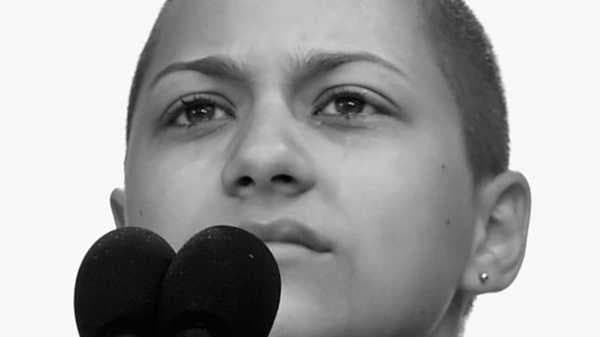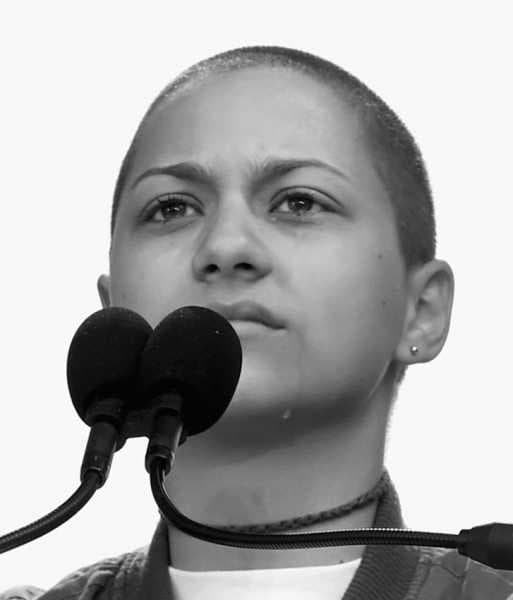

Photograph by Interfoto / Alamy

Photograph by Kevin Mazur / Getty for March For Our Lives
Since the mass shooting on Valentine’s Day at Marjory Stoneman Douglas High
School, in Parkland, Florida, in which a former student of the school
killed seventeen students and staff with a legally acquired
semiautomatic rifle, several of the survivors have become veteran
public speakers. At the March for Our Lives, on Saturday, in Washington,
D.C., speaking before thousands of people from a stage that framed the
outline of the Capitol, they delivered remarks at least as articulate as
those generally heard on the Hill. David Hogg gestured with disdain as
he called on his fellow first-time voters to turn out for the midterms
in 2018, and told lawmakers who were funded by the N.R.A. to “get your
résumés ready.” In a moment of unscripted eloquence, Samantha Fuentes, a
senior who was wounded in the attack, was so overcome with
emotion—“Lawmakers and politicians will scream, ‘Guns are not the
issue,’ but can’t look me in the eye,” she said—that she broke off and
vomited behind the podium. The Stoneman Douglas students shared the
stage with several other impressive young people, including Naomi
Wadler, a fifth grader who had previously organized a walkout at her elementary
school, in Alexandria, and who spoke in honor of young black women whose
lives have been taken by gun violence without making headlines; and Yolanda Renee
King, the nine-year-old granddaughter of Martin Luther King, Jr., who
gleefully led the crowd in a chant, “We are going to be a great
generation.”
But it was Emma González, a Stoneman Douglas senior, who provided the afternoon’s most memorable moment. Only days after the attack, González
offered a potent combination of composure and fury when she delivered a
speech at an anti-gun rally in Fort Lauderdale, her refrain of “We call
B.S.” swiftly cemented as one of this nascent movement’s slogans. On
Saturday, González, who is small and compact, and who wears her dark
hair cropped close to her skull, spoke for just a couple
of minutes, offering an emotional name-check of the students who had
died. Then, lifting her eyes and staring into the distance before her,
González stood in silence. Inhaling and exhaling deeply—the microphone
caught the susurration, like waves lapping a shoreline—González’s face
was stoic, tragic. Her expression shifted only minutely, but each
shift—her nostrils flaring, or her eyelids batting tightly
closed—registered vast emotion. Tears rolled down her cheeks; she did
not wipe them away. Mostly, the crowd was silent, too, though waves of
cheering support—“Go, Emma!” “We all love you!”—arose momentarily, then
faded away. She stood in this articulate silence for more than twice as
long as she had spoken, until a timer beeped. Six minutes and twenty
seconds were over, she told her audience: the period of time it took
Nikolas Cruz to commit the massacre.
Further Reading
New Yorker writers respond to the Parkland school shooting.
In its restraint, its symbolism, and its palpable emotion, González’s
silence was a remarkable piece of political expression. Her appearance
also offered an uncanny echo of one of the most indelible performances
in the history of cinema: that of Renée Maria Falconetti, who starred in
Carl Theodor Dreyer’s classic silent film from 1928, “The Passion of
Joan of Arc.” Based upon the transcript of Joan of Arc’s trial, in 1431,
Dreyer’s film shows Joan as an otherworldly young woman—she is nineteen,
to the best of her limited knowledge—who, in the face of a barrage of
questioning by hostile, older, powerful clerics, is simultaneously
self-contained and brimming over with emotion. Falconetti, who never
made another movie, gives an extraordinary performance, her face
registering at different moments rapture, fear, defiance, and
transcendence. Joan’s defense in the face of her inquisitors is largely
mute: when she is asked to describe Saint Michael—who, she blasphemously
claims, has appeared to her—she mostly refrains from verbal
response, her silence
bespeaking holy understanding greater than theirs. In the final phase of
her life, when Joan knows that she is to be martyred, Dreyer’s camera
lingers on closeups of Falconetti, with her brutally close-cropped hair,
her rough garments, and her anguished silence. Her extraordinary image
in that sequence could be intercut almost seamlessly with footage from Saturday’s rally.
The consonance is, presumably, accidental: González has said she cut her
hair short because longer hair gave her headaches and made her neck hot,
not because she was aiming to embody a cinematic interpretation of one
of the heroines of history. But the parallel is striking, because
González, with her fervor and her charisma, has already been claimed as
this moment’s Maid of Orléans. “Getting serious Joan of Arc vibes from
Emma Gonzalez,” Summer Brennan, the author, tweeted a couple of weeks ago; Victoria Aveyard, the author of the “Red Queen” series of Y.A. novels, told the Cut the same thing. Meanwhile, González and the other teens and preteens who
have been spurred to action by the atrocity at Parkland are being
heralded as future leaders by former leaders, and former would-be
leaders, at the highest levels. Hillary Clinton tweeted that the march
was “a reminder of what is possible when our future is in the right
hands, and when we match inspiration with determination.” President
Obama tweeted, “Michelle and I are so inspired by all the young people
who made today’s marches happen. Keep at it. You’re leading us forward.”
The desire to cede authority—even if it is only rhetorical authority—to
these young representatives whose passions are not compromised by
practicalities, is understandable: “Naomi Wadler is my President,”
tweeted the actress Tessa Thompson, giving voice to the feelings of
many. In the weeks since the teens of Parkland have become known to the
nation, it’s become conventional to point to the paradox that they are
“the adults in the room,” just as it has become a popular trope to
describe the President, who responded to the demonstrations with a
defensive and uncharacteristic silence, as a big baby, or as a
tyrannical toddler. But such characterizations of the President seem to
me misguided, a slur on the developmental progress of a small individual
through the necessary stages of childhood. Trump’s habitual petulance,
small-mindedness, aggression, self-involvement, entitlement,
mendaciousness, and vanity are not the behaviors of a child. Rather,
they more closely resemble the characteristics of an elderly autocratic
monarch of a feudal realm—King Lear without the poetry. The speakers on
Saturday were, on the other hand, genuinely childlike, in the best
sense of the term: uncompromising, passionate, forward-looking,
fearless.
In the iconography of “The Passion of Joan of Arc,” Joan has authority
not because she is wise but because she is innocent. She has the
privileged knowledge of the inspired, not the earned knowledge of the
experienced. The young people of Marjory Stoneman Douglas High School have
already experienced more than their elders would wish upon them; their
innocence is lost. Yet, like all young people, they’ve retained faith in
their generation’s unique ability to challenge and rectify the failures
of their elders. “Maybe the adults have gotten used to saying, ‘It is
what it is,’ but if us students have learned anything, it’s that if you
don’t study you will fail. And in this case, if you actively do nothing,
people continually end up dead, so it’s time to start doing something,”
González said in her speech in Fort Lauderdale, in February. “We’re
going to be the kids you read about in textbooks.” If they muster in
sufficient numbers in November, 2018, it’s not beyond the bounds of
possibility that, unlike most young people, they may be correct in this
assessment. In the meantime, our urgent need for the illumination that
they seem to offer—for the blunt, righteous conviction they uphold—is
another indication, were it needed, that a new kind of medievalism is
upon us. Our potential saviors gleam all the more brightly against the
pervasive political and civic darkness of the moment.
A previous version of this article incorrectly described the weapon used in the Parkland shooting.
Sourse: newyorker.com






